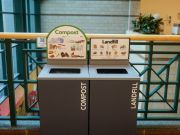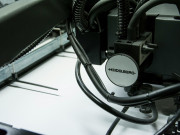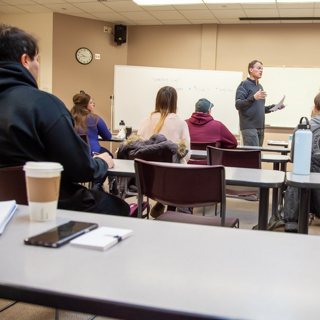Zero Waste
The University of Montana is committed to develop and implement a Zero Waste strategy that will be implemented over time for the entire UM Campus. The term Zero Waste may be unfamiliar to some, but the concept and practice of using our natural resources mindfully should not be. The following initiatives and programs provide a snapshot of UM's commitment to landfill diversion, appropriate recycling, increased composting, and finding appropriate solutions to deal with complex problems and materials.
Current Initiatives
-

New Recycling Bins and Signage
UM has committed to replacing the recycling signs and bins that have been purchased and installed incrementally over many years. New standardized bins are creating a positive image for recycling while the new signs are color-coded and have consistent labels and descriptions to assist any user to know where to place their item.
-

All in the Hall
In tandem with new signage and recycling bin rollout across campus, we are reducing the number of building and campus trash cans and matching all remaining landfill cans with appropriate recycling bins which clearly describe where the item you may have in your hand should be placed. This All in the Hall program has replaced deskside trash service in offices and classrooms with centralized hallway "zero waste stations" which require the user to sort and place their recycling and landfill items in the appropriate bin
Buildings currently utilizing All in the Hall include: Eck Hall, Aber Hall, Phyllis J Washington Education Building, University Hall, Mansfield Library, and Health Sciences.
-

Composting
UM Dining has a storied history of advancing sustainability programs including a robust composting program at our primary dining hall on campus known as the Food Zoo. More recent innovations in composting include post-consumer compostable materials, increased redistribution in UM Catering, and increasing composting hubs to new campus facilities.
-
University Center
-
Food Zoo
-
Rise+Rooted
-
Gallagher Business Building
-
-

Surplus Materials
UM has a dedicated Surplus Materials Manager and program to ensure useful items are not disposed of when there are many other outlets to donate or sell these items to.
Prior to donation or public and university sales, the Surplus Manager works across departments to find an appropriate home for useful items.
-

Campus Thrift
Campus Thrift is UM’s annual spring event to collect unwanted items from students leaving the residence halls and offer still usable items back to the campus community at a discounted rate.This event is hosted by UM's Office of Sustainability and UM Housing with proceeds from this event supporting UM’s Sustainability and Recycling Programs. Items not sold in the sale are donated to local thrift stores and nonprofit organizations.
-

Electronics
All UM-owned electronics are tracked and inventoried upon receipt. All items with personal or sensitive information are erased and sanitized to ensure data security. Our IT and Surplus Programs are able to redistribute many items back to campus users. Once deemed unnecessary on campus or through the affiliates of the Office of Public Instruction, select items are sold through Public Surplus auctions or donated to local nonprofits.
All remaining electronics are packaged and sent to an R2 Rios-certified facility for e-recycling.
-

Printing
UM has invested in a Managed Print Program to increase efficiencies across campus related to printing and paper use. This program replaced hundreds of deskside printers with modern and efficient centralized printing stations. These printing stations are rated EPEAT Gold and have the highest Energy Star Rating.
Several goals of the project include:
-
Reduce printing by 30%.
-
Reduce energy consumption by 40%.
-
Reduce printing costs by $100K per year.
-
Remove locally connected printers that are costly and pose a security risk.
-
-

Procurement
Business Services is committed to a purchasing policy that prioritizes sustainability criteria such as Energy Star and EPEAT devices whenever available. Many options are available for purchasing more sustainable items in Grizmart, as well as including sustainability language in contracts or RFPs.
